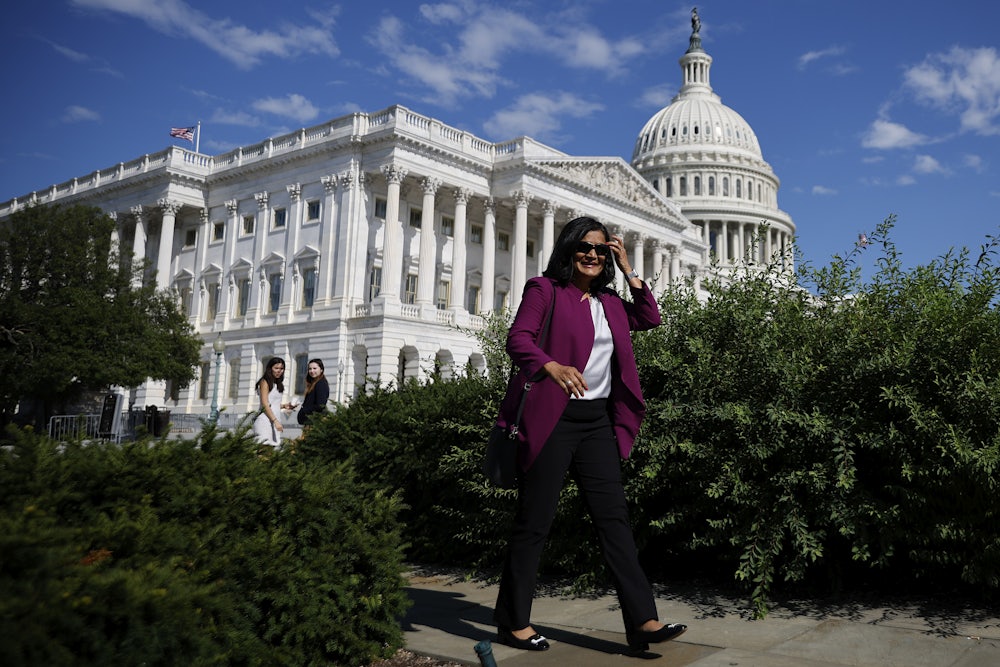Viewed from a certain perspective, the passage of the Inflation Reduction Act is a triumph for congressional Democrats and President Joe Biden. The House approved the legislation on Friday along party lines, sending it to Biden’s desk for a signature. With a stroke of his pen, the climate, health care, and tax policy bill will become law.
But from a different vantage, the bill represents the failure of Democrats to pass their ambitious social agenda, even with a trifecta of power. Provisions such as universal pre-kindergarten, the expanded child tax credit, childcare assistance, paid leave and affordable housing—components that featured heavily in Democrats’ plans only a year ago—were surgically removed from the corpse of the Build Back Better Act, upon whose bones the Inflation Reduction Act was constructed. The $2 trillion legislation which passed in the House last November was scrapped in the Senate, and whittled down to the $740 billion bill passed in the House on Friday—minus $300 billion in deficit reduction.
In a press conference ahead of the passage of the bill on Friday, Speaker Nancy Pelosi took a measured victory lap, touting the provisions while promising to take up the remaining matters. “This bill honors the Democrats’ promise to American families. After we pass it and the president signs it into law, we will continue to fight for the more family features of the bill not included in this legislation,” Pelosi said, her positivity echoed in her cheery lemon-yellow pantsuit. “This legislation is historic, it’s transformative, and it is really a cause for celebration.”
But Democratic leadership could be expected to support the bill. Perhaps more surprising is the extent to which the legislation has been embraced by progressives, even as it contains just a portion of their priorities. Nonetheless, they’ve been in sync with the operative philosophy of Democrats as a whole: to not let the perfect be the enemy of the good.
Progressives aren’t the only members of the caucus who wish the Build Back Better Act they’d hoped to pass had come to fruition. Most Democrats had larger ambitions for their reconciliation bill. But there was a time in the very recent past when they thought they would get nothing at all: First, after Senator Joe Manchin said he could not vote for the Build Back Better Act in December, and then again in July when he appeared to break off negotiations for a smaller package. Congressional Democrats were therefore shocked and delighted when Manchin and Senate Majority Leader Chuck Schumer announced a deal on the Inflation Reduction Act.
The bill passed the Senate with support from all 50 Democrats earlier this month, and Democrats pledged to take up the social issues addressed in the discarded portions of the bill when they return from their weeks-long recess. “We seem to have maxed out what is possible in a Joe Manchin-controlled Senate,” said Adam Green, the co-founder of the Progressive Change Campaign Committee.
But progressives in Congress argue that the bill they ended up with could not have been written and passed without their advocacy. “There would be no Inflation Reduction Act without Build Back Better. And there would be no Build Back Better without the Progressive Caucus,” said Representative Jamaal Bowman in a press conference by members of the Congressional Progressive Caucus ahead of the passage of the bill.
Representative Pramila Jayapal, the chair of the Congressional Progressive Caucus, argued that progressive hustle had ensured this current moment, including the caucus’s initial refusal to support a bipartisan infrastructure bill until Manchin announced support for a framework for the Build Back Better Act, a move that was widely decried even by fellow Democrats at the time. (The infrastructure bill ended up passing Congress, the Build Back Better Act obviously did not.)
“I wouldn’t say it’s like we’re not frustrated with what we’re leaving on the floor—‘heartbroken’ is the word I’ve been using. But I still think that everybody understands this is a massive step forward, and that the progressive stamp is very clearly on it, and that we wouldn’t be in this place without progressives,” Jayapal told me on Thursday. “Ninety-nine percent” of Democrats had supported the Build Back Better Act, she noted—providing a solid foundation for Democrats to continue to push that agenda in the future.
Representative Mark Pocan also pressed this narrative in the press conference on Friday. “I think it’s important that as we have this big celebration today, we remember the one group that was the strongest behind this, that held out the longest and made sure the conversations happened to this point, and that was the progressive caucus,” he said. (The final version of the bill was negotiated almost entirely by Schumer and Manchin.)
Democrats may promise to take on other priorities in the fall, but these claims should be accepted with less of a grain and more of a hefty boulder of salt. The House does not return from its recess until mid-September, at which point there will be only a month and a half until the midterm elections. Democrats used the reconciliation process for the Inflation Reduction Act, allowing them to circumvent the filibuster and pass the legislation with a simple majority. But most bills are subject to a 60-vote threshold to advance in the Senate, and it’s hard to see a measure, say, reinstating the expanded child tax credit without a work requirement garnering the support of 10 Republicans. Democrats say they will keep fighting, but that does not mean that they anticipate winning.
Still, the Inflation Reduction Act provides a campaign talking point ahead of what is expected to be a bruising midterm. Democrats could certainly use any kind of boost in November, as they are widely expected to lose the House and may also lose the Senate.
“When we’re thinking about, what is the way that we ultimately make the case to the American people, to our own base, that elections matter? That organizing year-round matters? that the government is capable of delivering for them—this is a really big deal,” Leah Greenberg, co-founder and co-executive director of Indivisible, told me. “We are seeing major promises fulfilled, and we will go to the American people in November, and we will say, ‘We have taken some major steps to make your lives better. And we want to take more, and here are the things that we will do if we are reelected, and if we’re given bigger margins.’”
Lest people complain that this article is focused more on style than substance, let us dedicate a few paragraphs to the contents of the Inflation Reduction Act. It includes ambitious measures that Democrats argue would cut greenhouse gas emissions by 40 percent below 2005 levels by 2030. (This is most of the way to Biden’s stated goal of cutting emissions by half by the end of the decade.) The bill includes tax credits and rebates to encourage consumers to purchase renewable technologies and energy-efficient appliances, such as electric vehicles, heat pumps, and solar panels. It also incentivizes companies to transition to renewable energy, or manufacture more components used in the production of clean technologies.
Representative Ro Khanna, a progressive with a friendly relationship with Manchin, told me that he had encouraged the West Virginia senator to support $300 billion or more in climate spending. “I was assuring him that if he had a big number on climate for the investments, that we’d be able to get the environmental groups and progressives on board,” he said. Although he has some issues with the bill, he described the progressive reaction to the provisions as “enthusiastic, but not without some reservation.”
Other climate provisions include a fee to penalize companies for excess emissions of methane, and environmental justice programs aimed at helping communities disproportionately affected by pollution and climate change. Some climate activists have raised concerns about provisions that would increase fossil fuel production, included as a sweetener for Manchin. Khanna also raised concerns about how offshore leasing requirements would disproportionately affect poor communities. Still, experts believe that the amount of emissions cut will far outweigh those created by the bill.
“We took a moment about a year ago to think, ‘What is the most important thing in the entire Build Back Better cluster of issues?’ And climate was clearly the most important thing for humanity’s existence,” Green said. “And this is a historic investment in climate, and everybody knows that, so I think for that reason alone it would be a source of real enthusiasm.”
Much of the Inflation Reduction Act is also focused on health care, extending Affordable Care Act subsidies and, critically, allowing Medicare to negotiate prescription drug prices. However, this will take some time before Americans feel the benefit of this provision: Medicare will be able to negotiate prices on a small selection of drugs, with prices taking effect in 2026. A provision to cap the price of insulin at $35 in the private insurance market was stripped out by Senate Republicans, but Democrats were able to retain a provision capping insulin prices at $35 for Medicare participants.
The final portion of the bill would overhaul tax policy, including a 15 percent minimum tax on corporations with profits over $1 billion and a 1 percent excise tax on stock buybacks by corporations. With the imprimatur of Senator Kyrsten Sinema, the minimum tax provision carves an exception for subsidiaries owned by corporations. In a provision much decried by Republicans, it also provides additional funding for the Internal Revenue Service to increase their enforcement for unpaid taxes.
Given the priorities that the Inflation Reduction Act does include, Democrats are happily leaving the gun and taking the cannoli. “I think that there is a lot of understanding about the reality of a situation where we only have the Democrats in the Senate, and we need every single one of them to vote for the bill. And therefore, this got carved down from our vision,” Jayapal said. But “the majority of progressives are very excited” about what is being accomplished, she said.
“I see the glass as more than half-full,” Representative Madeleine Dean, a member of the Congressional Progressive Caucus, told me ahead of the vote on Friday. “You can complain bitterly about what’s not in it. I’m more of a mind to celebrate what is in it.”










